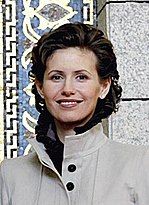Syria–United Kingdom relations
 | |
Syria |
United Kingdom |
|---|---|
Syria–United Kingdom relations refers to the bilateral relations between the Syrian Arab Republic and the United Kingdom of Great Britain and Northern Ireland, since the Syrian civil war, the United Kingdom has supported the Syrian opposition.[1] The United Kingdom closed its embassy in Syria in 2011, and the Embassy of Syria, London was closed the following year.[2]
History
[edit]20th century
[edit]World War I and Deir ez-Zor occupation
[edit]During World War I, the United Kingdom played a significant role in the Allied victory in Syria, collaborating with Arab Sharifian Army during the Arab Revolt, which was supported by British Army officer T. E. Lawrence. This partnership helped secure major victories, including the capture of Damascus in 1918.[3]
Following the war, the implementation of the Sykes-Picot Agreement shaped the division of the region, granting Britain influence outside Syria. On 11 January 1919, British forces occupied Deir ez-Zor, annexing it to Iraq. However, local resistance, supported by Iraqi officers and tribes, culminated in the city's liberation on 27 December 1919, as British troops withdrew to Iraq.[4]
World War II and Levant Crisis
[edit]In 1941, the British launched the Syria-Lebanon Campaign to counter Vichy French influence in the region, fearing it could bolster Axis powers. British troops, alongside Free French forces and Commonwealth allies, successfully invaded Syria and Lebanon, driving out Vichy French forces and establishing control under the Free French government.[5]
The British later became involved in the Levant Crisis of 1945, as tensions between the French and Syrians escalated. When French forces bombarded Damascus in May 1945 to suppress growing independence movements, the British intervened militarily, pressuring the French to withdraw. This intervention paved the way for Syrian independence and the end of French colonial rule, solidifying Britain's role in shaping the region's post-war order.[6]
1950s
[edit]On 6 November 1956, during the Suez Crisis, a Royal Air Force Canberra PR.7 was sent to overfly Syria on a photo reconnaissance mission, and was shot down by a Syrian Air Force Gloster Meteor. As of 2022, this was the last RAF aircraft shot down in an enemy air-to-air engagement.[7][8]
21st century
[edit]Ba'athist Syria
[edit]
In 2001, positive relations were developed between Prime Minister Tony Blair and the Syrian government, as part of the War on Terror.[10]
In 2002, President Bashar al-Assad made an official visit to the United Kingdom, the first Syrian leader to do so.[11] He and his wife Asma met with Queen Elizabeth II.[12]
In 2003, the British Syrian Society was established in London by Fawaz Akhras, father-in-law of Bashar al-Assad.[13]
Syrian civil war
[edit]
Since the emergence of Syrian civil war in 2011, relations have deteriorated, and the UK was one of the first countries to recognise the opposition as the sole legitimate representative of the Syrian people.[1] The Embassy of Syria in London closed in 2013.[14]
In 2018, the UK took part in the missile strikes against Syria alongside the United States and France.[15]
In March 2021, the British Government placed sanctions on key allies of Assad.[16]
Post-Assad regime
[edit]British prime minister Keir Starmer and foreign secretary David Lammy welcomed the fall of the al-Assad regime on 8 December 2024.[17][18] A week later, the UK announced a £50 million aid package to support food, shelter, healthcare, and restoring essential services in Syria.[19]
See also
[edit]- List of Ambassadors from the United Kingdom to Syria
- Syrians in the United Kingdom
- William Hague § Syria
- Operation Shader
References
[edit]- ^ a b MacFarquhar, Neil; Mourtada, Hania (19 November 2012). "Britain Recognizes Syria Opposition Coalition". The New York Times. Retrieved 16 February 2019.
- ^ Black, Ian; McGreal, Chris (29 May 2012). "Syrian diplomats expelled from countries around the world". The Guardian. Retrieved 20 April 2022.
- ^ Falls 1930, p. 589.
- ^ Ayyash, Abdul Qader (1989). The civilization of the Euphrates Valley. Syria – Damascus: Ahali for printing, publishing and distribution. p. 153.
- ^ Coulthard-Clark 1998, pp. 192–193.
- ^ Moubayed 2013, p. 65.
- ^ "Accident English Electric Canberra PR.7 WH799, 06 Nov 1956". Aviation Safety Network. Retrieved 27 March 2020.
- ^ Eason, Gary (2 August 2016). "The shooting down of Whisky Hotel 799". aerialcombat.co.uk. Retrieved 2 April 2021.
- ^ Rothwell, James (2021-03-08). "Syrian president Bashar al-Assad and his wife test positive for coronavirus". The Telegraph. ISSN 0307-1235. Retrieved 2021-03-09.
- ^ "Blair visits Syria for talks about war on Taliban". October 30, 2001 – via www.rte.ie.
- ^ Lauren Said-Moorhouse (2 June 2019). "From Assad to Xi, the Queen has met her fair share of controversial leaders". CNN. Retrieved 2021-03-09.
- ^ "Syrian president meets the Queen". The Telegraph. Retrieved 2021-03-09.
- ^ Booth, Robert (2012-03-15). "Assad's father-in-law: the man at the heart of UK-Syrian relations". The Guardian. ISSN 0261-3077. Retrieved 2021-03-09.
- ^ "The London Diplomatic List" (PDF). 3 December 2013. Archived from the original (PDF) on 12 November 2013.
- ^ "U.S. says air strikes cripple Syria chemical weapons program". www.yahoo.com. Retrieved 2021-03-09.
- ^ "UK imposes sanctions on key Assad allies after 'decade of brutality'". The Independent. 2021-03-15. Archived from the original on 2022-05-26. Retrieved 2021-04-22.
- ^ "PM statement on Syria". GOV.UK.
- ^ "Syria: Foreign Secretary's statement". GOV.UK. December 9, 2024.
- ^ "UK announces £50 million new support for vulnerable Syrians". GOV.UK. 15 December 2024.
Sources
[edit]- Coulthard-Clark, Chris (1998). Where Australians Fought: The Encyclopaedia of Australia's Battles (1st ed.). St Leonards, New South Wales: Allen & Unwin. ISBN 1-86448-611-2.
- Falls, Cyril (1930). Military Operations: Egypt & Palestine from June 1917 to the End of the War. Official History of the Great War Based on Official Documents by Direction of the Historical Section of the Committee of Imperial Defence: Volume 2 Part II. A. F. Becke (maps). London: HM Stationery Office. OCLC 256950972.
- Moubayed, Sami (2013). Syria and the USA: Washington's Relations with Damascus from Wilson to Eisenhower Volume 56 of Library of international relations. I.B. Tauris. ISBN 9781780767680.
